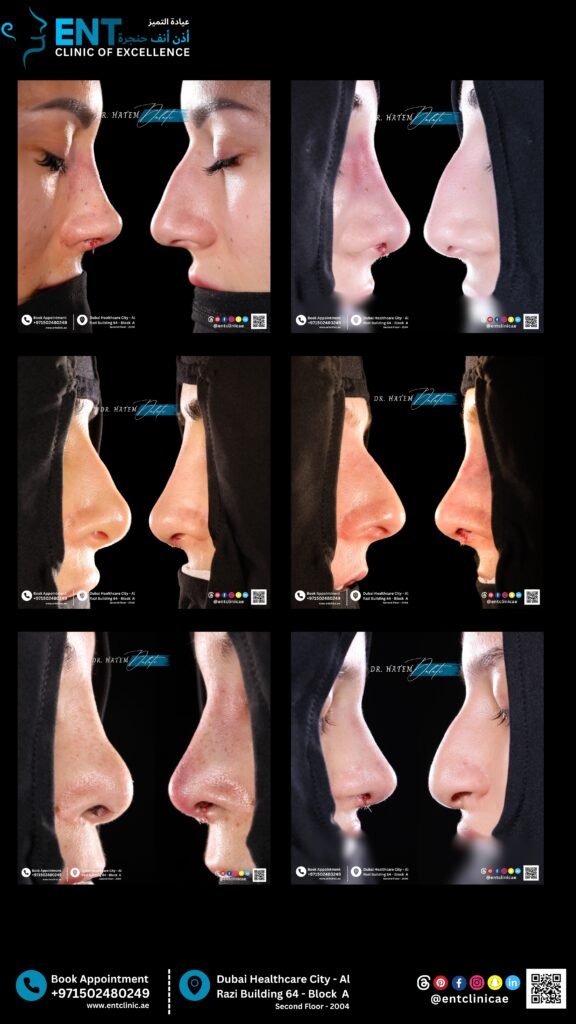
Is Rhinoplasty Safe If I Have Diabetes, Hypertension, or Other Health Issues?
If you’re considering rhinoplasty but have diabetes, high blood pressure, or other medical conditions, it’s natural to feel concerned about safety. Many patients ask whether health issues might increase surgical risks or prevent them from achieving their desired results.
The reassuring news is that rhinoplasty can be performed safely in patients with well-managed medical conditions. With proper evaluation, medical clearance, and an experienced surgeon, you can still enjoy both the cosmetic and functional benefits of nose reshaping surgery.
How Health Conditions Affect Rhinoplasty
Your overall health plays a key role in determining whether rhinoplasty is safe and how smoothly you recover after surgery. While rhinoplasty is generally safe, certain medical conditions can increase the risks of anesthesia, bleeding, infection, or delayed healing. That’s why a thorough medical evaluation and clearance are essential before undergoing nose surgery.
Below are the most common conditions that may impact rhinoplasty safety and outcomes:
1. Diabetes
- Impact on surgery: Poorly controlled diabetes can affect wound healing and raise the risk of infection.
- What surgeons do: Most surgeons request HbA1c results to ensure your blood sugar is well managed.
- Tip for patients: Keep your diabetes stable with diet, exercise, and medications before scheduling surgery.
2. Hypertension (High Blood Pressure)
- Impact on surgery: Uncontrolled hypertension may increase bleeding risks during surgery and slow down healing.
- What surgeons do: They will check that your blood pressure is under control with medication before proceeding.
- Tip for patients: Take your prescribed medications regularly and avoid stressors that can spike your BP before surgery.
3. Heart or Lung Conditions
- Impact on surgery: Conditions like heart disease, asthma, or chronic lung disease may make anesthesia riskier.
- What surgeons do: You may need special anesthesia clearance and extra monitoring during surgery.
- Tip for patients: Bring a recent report from your cardiologist or pulmonologist for your pre-op evaluation.
4. Bleeding or Clotting Disorders
- Impact on surgery: Disorders like hemophilia or medications that thin the blood (aspirin, warfarin, etc.) can increase bleeding during and after rhinoplasty.
- What surgeons do: Your medical team may adjust or pause certain medications safely before surgery.
- Tip for patients: Never stop blood thinners on your own—always follow your doctor’s guidance.
(Read next: Why Do Some People Bruise More After Rhinoplasty? Causes & Recovery Tips)
5. Autoimmune Diseases & Long-Term Medications
- Impact on surgery: Autoimmune conditions (such as lupus or rheumatoid arthritis) and medications like long-term steroids can slow healing and affect the skin or soft tissue response after rhinoplasty.
- What surgeons do: They may coordinate with your treating physician to optimize your condition before surgery.
- Tip for patients: Share a full list of your medications and recent health updates with your surgeon.
Why Medical Clearance Is Important
Before rhinoplasty, patients with health conditions usually undergo:
- Medical history review
- Blood tests and ECG
- Physician clearance (especially for diabetes, hypertension, or heart conditions)
- Medication review to avoid complications
This ensures your surgery is performed with the highest safety standards.
Expert Rhinoplasty in Dubai – Dr. Hatem Dalati
Dr. Hatem Dalati, Board-Certified ENT Consultant & Rhinoplasty Surgeon in Dubai Healthcare City, combines medical expertise with surgical artistry. With his background in ENT, he is uniquely qualified to perform rhinoplasty on patients with complex medical conditions, ensuring both safe surgery and natural-looking results. (Read more: Why Dr. Hatem Dalati Is the Best Choice for Rhinoplasty in Dubai)
FAQs
1. Can I get rhinoplasty if I have diabetes?
Yes, as long as your blood sugar is well-controlled. Your surgeon will review your HbA1c levels.
2. Is rhinoplasty safe with high blood pressure?
Yes, if your hypertension is controlled. Uncontrolled cases must be stabilized before surgery.
3. What if I take medications for my health condition?
Always disclose all medications to your surgeon. Some (like blood thinners) may need to be adjusted before surgery.
4. Will my recovery be slower if I have diabetes or hypertension?
Possibly, but with good management and follow-up, recovery is usually smooth.
5. Should I stop my allergy or blood pressure medications before surgery?
Never stop medications on your own—your doctor and surgeon will guide you.
Takeaway
Rhinoplasty is generally safe for patients with diabetes, hypertension, heart or lung conditions, clotting disorders, or autoimmune diseases—provided these conditions are well-controlled and medical clearance is obtained. Choosing an experienced surgeon like Dr. Hatem Dalati in Dubai ensures both safety and excellent results.
📍 Location: ENT Clinic of Excellence, Dubai Healthcare City
📞 Contact Us on WhatsApp: +971 50 248 0249 (WhatsApp) 📲
🌐 Visit our website: entclinic.ae
📱 Follow us for more ENT & Rhinoplasty tips: Instagram | YouTube | TikTok